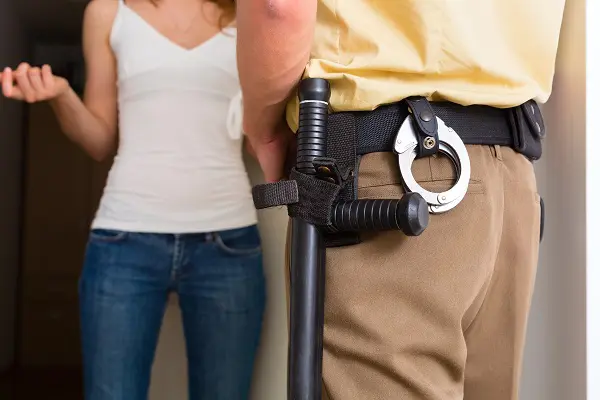Is it legal for law enforcement to search a private residence or business without a search warrant? It is if they have consent from the owners or occupants to do so.
This is the basis of the “knock and talk,” a popular investigative technique used by Houston law enforcement. Knock and talk allow law enforcement officials to enter a private residence without needing a search warrant or even probable cause.

What Are Knock and Talk Searches?
In the knock and talk, law enforcement officials — say HPD officers — knock on the front door of a residence and ask to come in and speak with the residents about some matter. In most cases, the residents, not wishing to appear to be uncooperative, agree and invite the officer in.
The officers’ real motives, in addition to questioning the residents, is to conduct a “plain view” surveillance of the premises to look for evidence of criminal activity — enough to make an arrest on the spot or to obtain a search warrant.
Don’t fall for the “knock and talk” — you could regret it. What you say and what they see could be all the probable cause law enforcement needs to get a search or arrest warrant.
Is “Knock and Talk” Legal?
The Supreme Court of the United States and others have upheld the constitutionality of knock and talk searches. The Supreme Court ruled that there is an implicit license that permits visitors (including law enforcement on official business) to approach a residence by the front path, knock on the door to announce their presence, wait briefly to be received, and if they are not received, to leave.
Defenses in a Houston Knock and Talk Arrest
Have you invited Houston law enforcement officials into your home only to be arrested or to have them return later with a search and arrest warrant? An experienced criminal defense attorney can help you protect your rights. There are many possible legal strategies to defend yourself against charges based on a knock and talk search.
How, when, and where are important components to any knock and talk defense strategy.
For instance, there’s how they attempted to gain access to your home. While the courts have upheld the legality of the knock and talk search procedure, there are limits on when and where they can conduct these types of searches. They’ve stressed that these searches must be consensual. Officers cannot use deceptive, aggressive, or coercive tactics to obtain access to a residence.
Where matters, too. The Supreme Court ruled that police entering your property to conduct a knock and talk search have the same rights as any other visitors. Generally, visitors are only legally allowed to approach a house from the front path and announce their arrival using the front door. The courts do not extend these same protections to visitors who knock on a side door, enter the backyard to knock on a back door, or knock on a window. A knock and talk search could be declared unconstitutional if the police attempt to contact you by any other means than knocking on the front door.
When they knock on your door can be important to your defense as well. Again, this has to do with the police being considered visitors. If your knock and talk arrest took place during the late-night or early morning hours could help your case; visitors generally don’t come knocking in the middle of the night.
The Best Defense: Exercise Your Right to Remain Silent (and Not Be Seen)
Remember, anything you say to an officer (as well as anything he can see in plain sight) can be used against you. The best way to protect your rights in a knock and talk situation is to exercise your right to remain silent. While the courts have ruled that knock and talks are legal, they have also ruled that the occupants of a residence have no obligation to open the door or speak to law enforcement officials that knock on their doors without a warrant. It may seem rude, but the law doesn’t require you to speak to the police when they knock or even answer the door when they show up without a warrant.
Another reason not to let them into your home is that what the officer sees can be used against you as well. For instance, an officer enters the house of someone suspected of drug trafficking. While there aren’t any drugs to be seen, there is drug paraphernalia lying out in plain view. This may be all the evidence an officer needs to obtain a warrant to search the premises. The next time they come back, they won’t be knocking on the door.
Get Help Protecting Your Rights
If you’ve been arrested and charged in connection to a Houston knock and talk search, it’s important to seek competent legal representation as soon as possible.
As you’ve seen above, there are many possible legal defenses in a knock and talk situation. Lisa Shapiro Strauss is an experienced Houston criminal defense attorney dedicated to protecting the rights of clients who have been arrested after questionable searches. In many instances, Lisa’s representation has resulted in reduced charges and even acquittal for her clients.
Don’t make a plea until you’ve contacted the offices of Lisa Shapiro Strauss to talk about your case.




